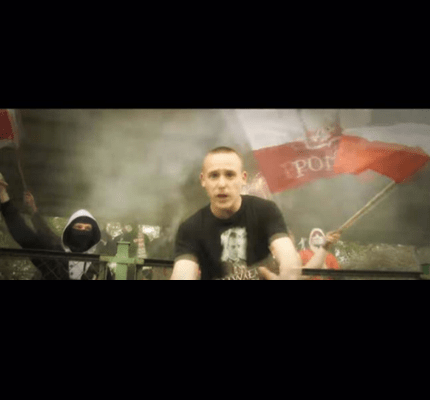
How Polish Nationalist Rap Re-Writes History and Spreads Racist Beliefs
Nationalism has been on the rise in Eastern Europe in the past decade. Nationalist rap is one avenue through which this racist and white supremacist ideology spreads among European youth. In a new article published in NCA’s Communication and Critical/Cultural Studies, Piotr Żuk and Paweł Żuk examine “heavy nationalist rap” video clips on YouTube and identify the thematic threads used by the most popular Polish nationalist rappers.
Nationalist Rap
Rap and hip hop began in the United States within the Black community as a way to speak back against mainstream culture. Rap has since expanded across the globe and has been appropriated by white artists, including white supremacists who use rap and hip hop to spread racist messages. CDs of nationalist rap can be found on websites that sell other nationalist products, such as clothing with nationalist themes. Żuk and Żuk argue that these websites owe their success in part to YouTube because nationalist rap videos on YouTube drive users to buy CDs from the websites.
The Political Context
After the fall of the Soviet Union in 1989, leftist political parties declined in Eastern Europe and right-wing nationalist parties rose to prominence. Some people who felt that they were disadvantaged by the new political and economic systems became ensnared by the language of nationalism, which blamed disadvantages on “foreign forces” and other outside influences. Burgeoning nationalist movements were further strengthened by Europe’s 2015 “migration crisis.” During this period, many refugees from Syria and elsewhere in the Middle East crossed the Mediterranean Sea to seek safety in Europe. In 2015, the nationalist PiS (Law and Justice) party won a majority in the Polish parliament in part by using nationalist language about the purported threats of refugees, migrants, and culturally different people.
Nationalist Rap
Żuk and Żuk identified nearly 200 YouTube video clips that fit within the genre of Polish nationalist rap. They then identified the most popular rappers and found several overlapping themes in those singers’ works: “Islamic threat,” “national martyrdom and historical memory,” “Poland as the European bulwark, EU critique, and multicultural model,” “critique of liberals and leftists,” “a call for action in the name of nationalist ideas,” and “references to class divisions and hostility towards the system of inequality and oppression.” Finally, they collected lyrics from the most popular rappers’ songs and analyzed the content using the themes.
Many of the songs indicate that the rappers and their fans have not benefitted from the political changes that have taken place in Poland since 1989. According to Żuk and Żuk, these songs blend language about national martyrdom, such as “Eternal honor and glory to the best sons of Poland,” with language that criticizes the powerful elites as “national traitors.” One song, titled “Honor and Homeland,” includes the lines:
Instead of honest people, the stools are occupied by skunks
That would sell their homeland for a few pounds
These songs also sometimes tie nationalist themes to anti-Islamic fears, as well as criticism of Western Europe where some Eastern Europeans have relocated in search of higher-paying jobs.
Far-right populists have also sought to reclaim parts of Polish history. In particular, nationalists have sought to create heroes out of the members of the post-1945 anti-communist underground movement, which Żuk and Żuk describe as having a “nationalist orientation.” Consider, for example, these lyrics from the song, “Today it is WE who care about memory”:
A patriot, an ordinary boy is talking to you,
Who knows what he is talking about and does what he loves,
He raises the flag high because he is proud of his origin …
Patriotism is not a fashion, but the meaning of my existence
Żuk and Żuk note that right-wing nationalists use historical narratives like this to accomplish political goals and legitimize their actions. Nationalist rappers particularly idolize the group National Radical Camp (Obóz Narodowo-Radykalny or ONR). According to Żuk and Żuk, ONR was characterized by “extreme anti-Semitism, anti-communism, and Catholic nationalism striving for the creation of the Catholic State of the Polish Nation.” Today, nationalist groups and nationalist rap have sought to model this, but have replaced anti-Semitism with Islamophobia.
A number of the songs also contain references to street culture. For example, “We’re Going Out Into the City” describes “White hooligans/Polish warriors/The pure blood/Of this dirty street” who are spray painting “tags” (or graffiti) in the city. Żuk and Żuk argue that the comments on the video reveal that the audience for the song is primarily made up of white supremacists, racists, and neo-Nazis who are members of the far-right nationalist movement. These songs also make clear that the enemies of nationalists are not only refugees, but also leftists and anyone left of the far right, such as defenders of LGBT rights, feminists, and supporters of the EU.
Conclusion
Żuk and Żuk argue that nationalist rap in Poland “should be interpreted as a sign of cultural counter-reaction to the liberal order of the EU, which the supporters of the extreme right in Poland associate with multiculturalism, openness to immigrants, and—as they call it—'gender ideology,’” which they view as a threat to traditional Polish family life. However, although nationalist rhetoric is expressed in the language of cultural and ethnic exclusion, it often draws on a sense of real economic injustice. From this perspective, nationalist rap is an identity response to class marginalization. The authors conclude that nationalist rap in Poland is connected to Eastern European right-wing populist discourses that traffic in anti-immigrant sentiment and encourage discrimination based on race and ethnicity.



